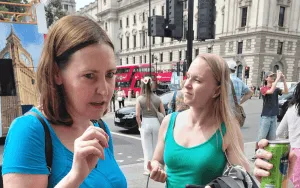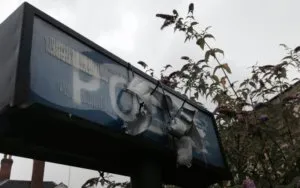Only nine disability hate crimes in the whole of London led to significant action being taken by police last year, politicians have been told during a disabled people’s election hustings event.
Although 600 disability hate crimes were recorded by the Metropolitan police in the year to January 2024, just 1.5 per cent of them were cleared up through formal action – known as sanction detections – such as a criminal charge or a caution to the offender.
The figures were revealed by Jack Gilbert, a police adviser for two decades and chief executive of Real, a disabled people’s organisation based in Tower Hamlets, which has secured the data for a report it has yet to publish.
Gilbert has been a member of the Metropolitan Police Service’s (MPS) LGBT+ independent advisory group for more than 20 years, and has also been involved in intersectional community relations work in east and north London.
He told the London mayoral hustings event that statistics from the force on the number of disabled victims of crime suggested that the figures the MPS was collecting were not reliable.
Despite Office for National Statistics figures from the Crime Survey for England and Wales showing disabled people were far more likely to experience anti-social behaviour, domestic abuse, sexual assaults and violent crime, only about 2.5 per cent of all crimes recorded by the MPS are “tagged” to indicate they relate to a disabled victim.
Gilbert called for all the mayoral candidates to commit to drawing up a disability action plan for the MPS if they win May’s election.
The hustings event (pictured) was organised by Inclusion London so the candidates for next month’s London mayoral election could be questioned by disabled Londoners.
But only one of the four candidates turned up to the event – Green candidate Zoë Garbett – while Conservative candidate Susan Hall, Labour’s Sadiq Khan and Liberal Democrat Rob Blackie all sent spokespeople in their place (see separate story).
Inclusion London’s co-chair, Adam Gabsi, who was chairing the hustings event, told the panel of speakers that too many disabled people felt unsafe in London and that they were often not “believed and supported by the police when reporting crimes”.
Gabsi asked the representatives of the four parties what their plans were to tackle disability hate crime in London, and what actions they would take to tackle disablism in the Metropolitan police, “to make sure all disabled Londoners feel they can trust the police and report crimes”.
Gilbert and Gabsi’s concerns came almost exactly a year after Baroness Casey’s review of the force’s culture and standards was heavily criticised by disabled campaigners for finding significant evidence of disability discrimination across the force, but failing to conclude that the MPS was institutionally disablist, even though she found it to be institutionally racist, sexist and homophobic.
Garbett had already told the event that she recognised that the Met was “rarely held to account on addressing the disablism within their service”, and she promised to do so if she was elected mayor.
She said she would “hold the Met to account to reform to make sure that disabled Londoners can trust that it’s a service you can report crime to, and I will make sure that there is regular training on inclusion, and I will challenge all forms of hate”.
She also promised to commit to “genuine co-production” of policies with disabled people if she was elected.
In her response to Gabsi, Garbett said she believed that “the disablism within the Met often gets erased when people talk about the homophobia, racism and misogyny” and she called for action on “rooting out the bad officers, improving recruitment” and ensuring “appropriate training”.
In response to Gilbert, she said she fully supported a disability action plan and called for it to be co-produced with disabled people, while also stressing the need for the “right data”.
Sadiq Khan, the current mayor, was one of the candidates who failed to turn up to the hustings, and his spokesperson failed to mention disablism or disability hate crime in her response to Gabsi, although she accepted that disabled Londoners “have been let down by the police and a culture change is now required to address this”.
In response to Gilbert, she said the lack of accurate statistics was “completely appalling”, and she appeared to support a disability action plan for the Met, although she was not clear on whether the mayor would implement this policy if re-elected.
Conservative candidate Susan Hall also failed to turn up to the hustings, but her spokesperson said his party would “sign-up to the disability action plan”, although again it was not clear whether this was a solid policy commitment from Hall.
He also called for “better records of the crimes against disabled people”.
Liberal Democrat Rob Blackie also failed to attend, and his spokesperson said there was “not enough data or accurate data about hate crime towards disabled Londoners”, and she agreed with the call for a disability action plan, although yet again it was unclear whether this was a policy commitment from Blackie if he became mayor.
A note from the editor:
Please consider making a voluntary financial contribution to support the work of DNS and allow it to continue producing independent, carefully-researched news stories that focus on the lives and rights of disabled people and their user-led organisations.
Please do not contribute if you cannot afford to do so, and please note that DNS is not a charity. It is run and owned by disabled journalist John Pring and has been from its launch in April 2009.
Thank you for anything you can do to support the work of DNS…

 Disabled MP who quit government over benefit cuts tells DNS: ‘The consequences will be devastating’
Disabled MP who quit government over benefit cuts tells DNS: ‘The consequences will be devastating’ Ministers are considering further extension to disability hate crime laws, after pledge on ‘aggravated’ offences
Ministers are considering further extension to disability hate crime laws, after pledge on ‘aggravated’ offences ‘We will not give a single inch,’ disabled activists vow, as Kendall publishes disability cuts bill
‘We will not give a single inch,’ disabled activists vow, as Kendall publishes disability cuts bill